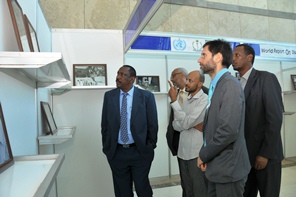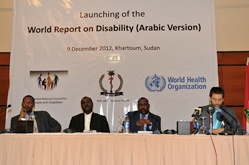 WHO Representative for Sudan Dr Anshu Banerjee together with Health Minister Bahr Idriss Abu-Garda talk with one of the photographers whose work is dispalyed in a photo exhibition depicting conditions of people with disability.The World Health Organization (WHO), in collaboration with the World Bank and the Federal Ministry of Health, launched the Arabic version of the first World Report on Disability on 9 December 2012 in Khartoum, Sudan.
WHO Representative for Sudan Dr Anshu Banerjee together with Health Minister Bahr Idriss Abu-Garda talk with one of the photographers whose work is dispalyed in a photo exhibition depicting conditions of people with disability.The World Health Organization (WHO), in collaboration with the World Bank and the Federal Ministry of Health, launched the Arabic version of the first World Report on Disability on 9 December 2012 in Khartoum, Sudan.
The report highlights the challenges that people with disabilities encounter in their everyday lives, including emotional, social, as well as financial difficulties. Recommendations for action are presented in the report for local, national and international levels. Moreover, the report is considered an important tool for those involved in disability issues, such as government, civil society organizations and disabled people’s organizations.
Though with less support, Sudan has long been attempting to address the challenges to unlock the potentials of those with disabilities. According to Sudan’s Population Census conducted in 2008, the disability rate has increased over the years, from 1.6% in 1993 to almost 5% in 2008.
 Sudan's Health Minister Bahr Idriss Abu-Garda and WHO Representative Dr Anshu Banerjee during the launch of the Arabic Version of the World Report on Disability in Khartoum, Sudan.The most common types of disability in Sudan are blindness (31%) and mental disability (24%). Around 6% of people with disability are children under five years of age, while 28% of those with disability are aged 60 years and older. People with disabilities are facing challenges including access to health, support, rehabilitation, education, as well as employment. Sudan’s Population Census (2008) indicated that 38% of persons with disability aged six and older are enrolled in schools, while 15% have previously attended school at some point; 41% have never attended schools. Only 50% of the total number of persons with disability (working age) are employed.
Sudan's Health Minister Bahr Idriss Abu-Garda and WHO Representative Dr Anshu Banerjee during the launch of the Arabic Version of the World Report on Disability in Khartoum, Sudan.The most common types of disability in Sudan are blindness (31%) and mental disability (24%). Around 6% of people with disability are children under five years of age, while 28% of those with disability are aged 60 years and older. People with disabilities are facing challenges including access to health, support, rehabilitation, education, as well as employment. Sudan’s Population Census (2008) indicated that 38% of persons with disability aged six and older are enrolled in schools, while 15% have previously attended school at some point; 41% have never attended schools. Only 50% of the total number of persons with disability (working age) are employed.
The World Report on Disability will be a guide to Sudan to create enabling environments, develop rehabilitation and support services, ensure adequate social protection, create inclusive policies and programmes, and enforce new and existing standards and legislation, to the benefit of people with disabilities and the wider community.





